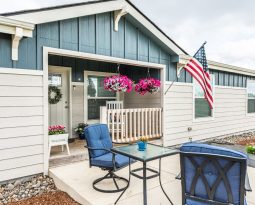FACTORY-BUILT HOME CONCEPT IS A HOT IDEA IN U.S. CITIES WITH A SHORTAGE OF AFFORDABLE HOUSING
It may seem counterintuitive, but affordable housing can be incredibly expensive to build – much as $375,000 per unit in Chicago, say non-profit developers. That’s due to stringent requirements around materials, regulations, and wages paid to workers. And it is why public subsidies are necessary to build affordable units in urban areas.
A Chicago company (Skender) claims to have a unique answer to the city’s affordable housing shortage: modular homes.
And a major Chicago developer is buying into the idea.
Sterling Bay, developer of the Lincoln Yards megaproject says it’s planning to buy 100 vacant lots to plant modular housing there, reports WBEZ 91.5 Chicago.
In a giant warehouse on the Southwest Side, the Skender construction company will begin producing Chicago three-flats on an assembly line, as if they were cars, starting within a few days.
To kick things off, Sterling Bay is purchasing the first 10 three-flats to roll off Skender’s production line. They hope to have the first families living in them by the end of August.
Production time for a fully constructed three-flat is just six days. After that, the completed “modules” – think of them as rooms or apartments, complete with windows, flooring and painted walls – get shrink wrapped, put on a truck and driven to vacant lots where they will be stacked into three flats.
“We’re completely changing the paradigm here for the construction process, which will drive the price of the home down,” said Stacey Scopano, Skender’s chief technology officer.
Skender says it’s factory-produced modular will meet all city codes. The facility will employ 150 union workers.
 SIMILAR MANUFACTURED HOUSING CONCEPTS IN SAN FRANCISCO, NEW YORK CITY, AND BROOKLYN, N.Y.
SIMILAR MANUFACTURED HOUSING CONCEPTS IN SAN FRANCISCO, NEW YORK CITY, AND BROOKLYN, N.Y.
Like similar companies in Brooklyn and San Francisco, Skender believes it can build homes faster and cheaper in its factory than is possible through traditional construction methods. And it believes the manufacturing environment will allow them to build longer-lasting, more energy efficient homes.
The prefabricated modular concept is a hot idea in numerous U.S. cities with a shortage of affordable housing. In New York City, Mayor Bill De Blasio wrote modular homes into the city’s 2017 housing plan. (That latest version of the De Blasio plan took aim at unused real estate, proposing a tax hike on vacant land and competition to build 400 plus square feet “tiny homes” on small city-owned property).
Last year, San Francisco Mayor London Breed announced plans to put $100 million in city dollars toward a factory that churn out hundreds of affordable modular units.
“The cost of building and constructing affordable housing has long been a source of angst in the development community and for the city,” said Marisa Novara, Chicago’s newly named housing commissioner.
“We need to be creative and try new ideas,” said Novara. “[Mayor Lori Lightfoot] talked about things like shipping containers and tiny homes. And I think [modular homes] fits right in line with some of those ideas.”







